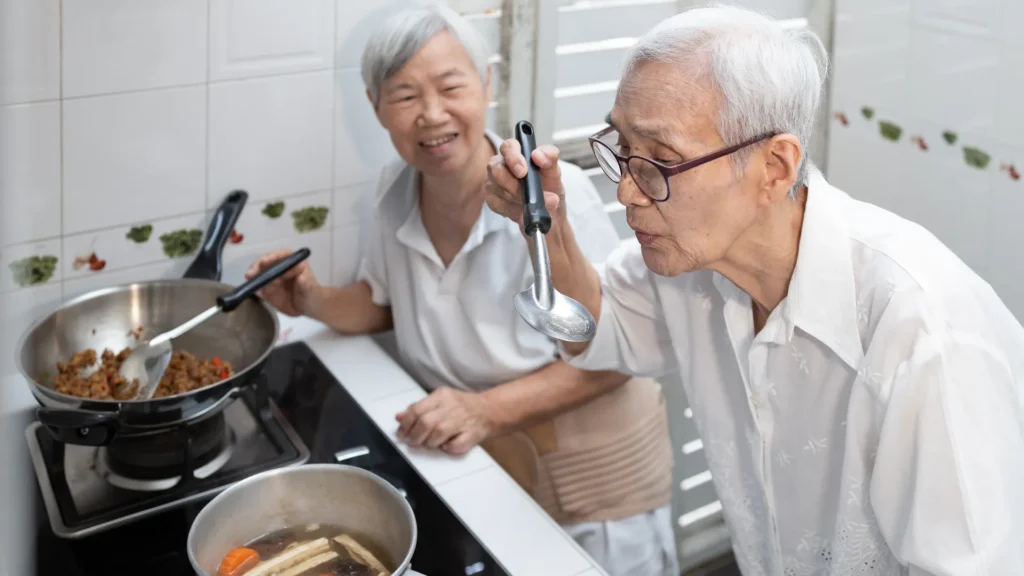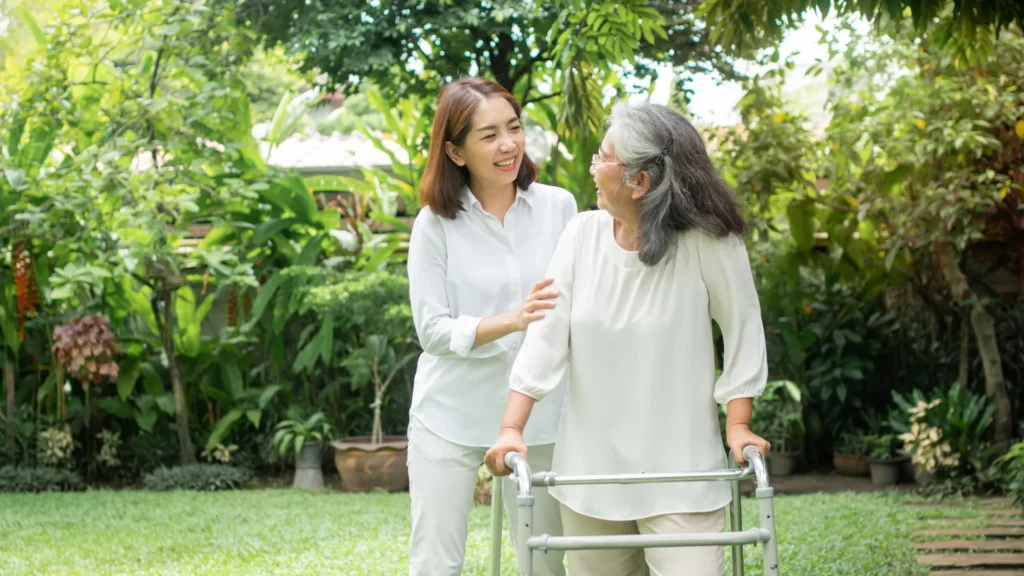As we get older, our bodies go through many changes that can cause various health problems as an elderly adult. These problems can include things like joint pain, heart problems, memory loss, and high blood sugar levels. Managing these health problems in the elderly is important not only for living longer but also for enjoying life to its fullest. With the right strategies, seniors can take control of their health and continue doing the things they love.
In this article, we’ll explore 5 practical tips for dealing with common health problems in older adults. Each tip is designed to give seniors the knowledge and resources they need to manage their health effectively. By following these suggestions, older adults can improve their overall well-being and age in a positive and active way.
1. Understand the Common Health Problems Faced by the Elderly

As we age, our bodies become more susceptible to certain health conditions. Arthritis, heart disease, cancer, respiratory diseases, and Alzheimer’s disease are among the most common health problems faced by seniors. Gaining a clear understanding of these conditions is the first step towards effective management and improving quality of life.
1.1. Managing Arthritis: Relieving Joint Pain and Improving Mobility
Arthritis is a prevalent condition among older adults that can cause significant discomfort and mobility challenges. The key to managing arthritis lies in a combination of consistent physical activity, medication adherence, and use of assistive devices when necessary.
Physical Activity
Engaging in regular exercise is essential for relieving joint pain and improving mobility for those living with arthritis. Water aerobics and tai chi are particularly beneficial as they put less stress on joints while promoting strength and flexibility.
- Water Aerobics: This low-impact activity allows seniors to exercise without applying excessive pressure on their joints. It also enhances cardiovascular health.
- Tai Chi: An ancient Chinese practice known for its gentle movements and deep breathing techniques, Tai Chi improves balance, flexibility, muscle strength, and overall fitness.
Medication Adherence
Following prescribed medications consistently is critical in managing arthritis symptoms effectively. However, it is not uncommon for seniors to forget taking their medication due to memory lapses or confusion with multiple prescriptions. As such, setting reminders or using pill organizers can be beneficial for ensuring regular medication intake.
Assistive Devices
Using assistive devices like walking canes or braces can provide additional support for individuals with arthritis. These tools can significantly improve mobility and independence by reducing pressure on affected joints and providing stability.
It’s worth noting that each individual’s experience with arthritis is unique. Hence, it’s important to consult with healthcare professionals to devise a personalized management plan.
1.2. Controlling Heart Disease through Lifestyle Modifications and Medications
Heart disease is a common health concern among older adults, with potential implications on their daily lives. Heart conditions, if not managed effectively, can lead to serious complications such as heart attacks and strokes.
Embracing a Heart-Healthy Lifestyle
The journey to managing heart disease begins with adopting a balanced, low-sodium diet and making certain lifestyle changes:
- Incorporate more fruits, vegetables, lean proteins, and whole grains into your meals
- Limit the consumption of processed foods that are high in unhealthy fats and sodium
- Keep track of your salt intake by reading food labels and opting for low-sodium alternatives
- Engage in regular physical activity, such as walking or swimming, to strengthen your heart muscles
- Avoid smoking and excessive alcohol consumption, as they can worsen heart conditions
By following these guidelines, you can improve your overall cardiovascular health and reduce the risk of future heart-related problems.
Read More: Happier with Healthier Food
Monitoring Your Vitals at Home
Regular self-monitoring of blood pressure and cholesterol levels is also essential for those with heart disease. Home-based devices for monitoring these vitals can empower seniors to keep track of their health status and take corrective actions when necessary.
Here are some tips for monitoring your vitals at home effectively:
- Invest in a reliable blood pressure monitor and learn how to use it correctly
- Measure your blood pressure at the same time each day, preferably before taking any medications
- Keep a record of your readings and share them with your healthcare provider during check-ups
- Follow any specific instructions given by your doctor regarding medication adjustments based on your blood pressure readings
- Similarly, if you’re prescribed medications to manage cholesterol levels, regularly monitor them using a home cholesterol testing kit
- Discuss the results with your doctor to determine if any changes are required in your treatment plan
By actively monitoring these key indicators of heart health, you can detect any deviations from the normal range early on and seek prompt medical attention if needed.
The Role of Medications in Heart Disease Management
Medications also play a significant role in controlling heart conditions. Particularly, the use of statin drugs is vital for preventing cardiovascular events for those with heart disease. These drugs lower cholesterol levels in the blood, reducing the risks associated with heart conditions.
However, adherence to medication regimens is crucial. Irregular intake or skipping medications can lead to adverse outcomes. It’s recommended that caregivers or family members assist seniors in managing their medication schedules to ensure consistent intake.
Here are some tips for medication management:
- Use pill organizers with compartments for different days and times to avoid confusion
- Set reminders on your phone or use medication reminder apps to alert you when it’s time to take your pills
- Keep a list of all your medications, including dosages and frequencies, and share it with your healthcare provider
- Refill your prescriptions ahead of time to avoid running out of medication
- If you experience any side effects or have concerns about your medications, discuss them with your doctor before making any changes on your own
Remember, medications are just one part of the treatment plan. They should be complemented with lifestyle modifications for optimal results.
Although managing heart disease requires discipline and commitment, the benefits are worth the effort; it can significantly improve quality of life and promote active aging.
1.3. The Role of Caregivers in Supporting Individuals with Alzheimer’s
Alzheimer’s disease is a significant concern for older adults, affecting their daily lives and requiring continuous care. As memory loss and thinking skills decline, people with Alzheimer’s often depend on caregivers for most of their needs. This is where assistive technologies and strategies become crucial in managing the condition effectively.
How Caregivers Can Support Individuals with Alzheimer’s
Here are some ways caregivers can support individuals with Alzheimer’s:
- Memory Aids: Caregivers can introduce memory aids to help the person with Alzheimer’s become more independent. For example:
- Using reminder apps on smartphones or tablets to remind them about taking medications or going to appointments.
- Using pill organizers to ensure they take their medications correctly.
- Respite Care: Taking care of someone with Alzheimer’s can be demanding and overwhelming. It’s important for caregivers to take breaks and recharge themselves. Seeking respite care services allows caregivers to have some time off while ensuring their loved ones receive proper care.
By using these approaches, caregivers can make life easier for individuals with Alzheimer’s and also take care of their own well-being.
Read More: Have Your Loved One Show These Warning Signs of Dementia?
2. Promote Healthy Aging Through Lifestyle Choices

Embracing an active lifestyle is a key factor it comes to managing common health problems in the elderly. Known as holistic care, it encourages seniors to take charge of their health and well-being through regular physical activity and social engagement.
2.1. Benefits of Exercise for the Elderly
Regular exercise provides immense benefits for seniors, from improving physical strength to enhancing mental wellness. It’s not just about staying fit; active lifestyles pave the way for healthier aging and better management of chronic illnesses.
Strength Training
Strength training exercises are particularly beneficial for the elderly, given their potential to prevent falls – a prevalent concern among this age group. These exercises aim to increase muscle strength, improve balance, and enhance coordination, thereby reducing the risk of accidental falls.
- Chair squats
- Leg raises
- Light weightlifting
Notably, these activities can be modified based on an individual’s fitness level and comfort.
Balance Exercises
Balance exercises also play a crucial role in promoting healthy aging. By improving stability, these exercises help reduce the risk of fractures – a common outcome of falls in older individuals.
- Tai Chi
- Yoga
These low-impact exercises focus on gentle movements and deep breathing techniques that not only improve balance but also promote relaxation and stress relief.
Before starting any new exercise regimen, it’s essential to consult with healthcare professionals or physiotherapists. They can provide personalized advice based on an individual’s health status and abilities.
Incorporating regular physical activity into daily routines doesn’t have to be tedious or strenuous; even simple activities like gardening or walking can make a significant difference in promoting active aging.
Read More: Diet or Exercise: Which is better for losing weight?
2.2. Nurturing Social Connections in the Golden Years
Adopting a holistic approach to care is paramount for the health and well-being of older adults. Beyond medical interventions, lifestyle choices play a significant role. Regular exercise, including strength training and balance exercises, acts as a catalyst for maintaining physical health. Coupled with these activities, fostering social engagement is equally critical.
The Power of Social Connections for Seniors
Social relationships are known to have a profound impact on mental and emotional health. For seniors, these connections can:
- Reduce the risk of depression
- Lower stress levels
- Improve cognitive function
Overcoming Challenges to Stay Socially Active
However, there can be hurdles to staying socially active. Mobility issues, hearing impairments, or the absence of nearby family can hinder regular social interactions.
Here’s where technology use comes into play:
- Video calls, social media platforms, and online communities can offer:
- A means to stay connected with loved ones far away
- Access to virtual events and workshops
- Opportunities for learning new skills or hobbies online
While technology has much to offer, it’s essential to navigate its use with care. Ensuring online safety and providing guidance on using digital devices are necessary steps to maximize benefits while minimizing risks.
Creating an Enriched Social Fabric for the Elderly
Encouraging participation in community activities or clubs can enhance these social bonds. Whether it’s joining a book club, partaking in group exercises, or volunteering, each interaction contributes to an enriched social fabric for the elderly.
By integrating physical activity with robust social networks, seniors can enjoy a more vibrant and fulfilling life during their golden years.
Read More: How to Improve Social Skills and Increase Social Intelligence
3. Leverage Technology for Better Health Management

The digital era brings with it innovative solutions that are reshaping healthcare delivery, especially for the elderly. Mobile health apps and telemedicine services stand out as pivotal tools in supporting seniors to monitor their health conditions conveniently from home.
The Role of Telemedicine Services in Elderly Healthcare
Telemedicine services in Singapore have emerged as a game-changer in elderly healthcare. Through virtual consultations, seniors can access medical advice and prescriptions without leaving their homes. This is particularly beneficial for those with limited mobility or residing in remote areas. Additionally, wearable devices and remote monitoring systems enable healthcare providers to track vital signs and detect any alarming changes in real-time, ensuring timely interventions and proactive care.
Cognitive decline is a common concern among the elderly in Singapore. However, several digital tools like brain-training apps, puzzles, and memory games can help seniors keep their minds sharp and active. These tools not only offer entertainment but also serve as effective cognitive exercises that can potentially slow down cognitive decline.
4. Tap into Community Programs and Services

Seniors in Singapore have access to a wealth of community programs that offer support and activities to enhance their overall well-being. One such initiative is the Live Well, Age Well Programme, which provides free health activities designed specifically for older adults. These programs not only cater to physical health but also work towards nurturing a vibrant community among seniors.
Participating in these activities can include joining exercise classes tailored for senior citizens, attending workshops on nutrition, or learning about disease management. These communal experiences are crucial as they foster a sense of belonging and purpose, which is essential during the golden years.
Healthier SG Enrolment
Another significant development for seniors is the Healthier SG initiative. This government scheme offers enhanced healthcare subsidies and benefits, making healthcare services more accessible and affordable for older adults. With a focus on preventive care, Healthier SG emphasizes regular health screenings and follow-ups with family physicians.
Eligible seniors are strongly encouraged to enroll in this program to take advantage of the personalized health plans crafted to meet their unique needs. By doing so, they can stay ahead of potential health issues and enjoy peace of mind knowing that their well-being is being proactively managed.
Supporting Dental Health in the Elderly
When it comes to maintaining good health in later years, oral hygiene practices should not be overlooked. Proper brushing, flossing, and regular check-ups are critical components of dental care for the elderly. Maintaining dental health is vital not just for comfort but also because it can affect overall health; issues such as gum disease have been linked to other chronic conditions like heart disease.
Regular dental visits allow for the early detection and treatment of problems such as tooth decay or oral cancers — common issues that can significantly impact one’s quality of life if left unaddressed. It’s essential that seniors prioritize their oral health as much as any other aspect of their well-being.
By tapping into these community resources and prioritizing areas like dental health, seniors can better manage common health problems and enjoy a more active and fulfilling lifestyle. It’s about taking control where possible and utilizing available support systems to navigate the complexities of aging with grace and resilience.
5. Creating a Safe Living Environment for Seniors

Ensuring the safety of older adults is crucial, especially when it comes to preventing falls and injuries. By making a few simple changes around the house, we can significantly reduce the risk of accidents and create an environment that supports their needs. Here are some key modifications to consider:
How to Make Your Home Safer for Seniors
- Eliminate Tripping Hazards: Secure rugs, remove clutter, and ensure pathways are clear.
- Improve Lighting: Install bright, non-glare lights in hallways, staircases, and night paths to the bathroom.
- Install Grab Bars: Place these in critical areas such as the bathroom near the toilet and shower to provide support.
- Adjust Furniture Height: Ensure chairs and beds are at a height that allows seniors to sit and stand easily.
- Non-Slip Surfaces: Use mats in the bathroom and kitchen, where floors can become slippery.
By making these changes, we not only reduce the chances of accidents but also promote independence among seniors. When they feel safe and supported in their own homes, they’re more likely to maintain their autonomy and enjoy a better quality of life. Creating a supportive living space does more than just safeguard health; it promotes independence among seniors.
A Proactive Approach to Senior Health
Health Problems in the Elderly is a topic that merits thoughtful attention. It’s undeniable that as we age, our bodies undergo changes that may lead to health problems. Yet, equipped with the right knowledge and resources, we can make these golden years truly golden.
Tips for Managing Senior Health
Here are some proactive steps seniors can take to manage their health:
- Understand and manage common ailments: Learn about conditions like arthritis and heart disease, their symptoms, and treatment options. Follow your doctor’s advice and take prescribed medications regularly.
- Promote an active lifestyle: Engage in regular physical activity that suits your abilities, such as walking, swimming, or yoga. Consult a fitness professional if needed.
- Leverage technology for health management: Use smartphone apps or wearable devices to track your vitals, remind you to take medications, and communicate with healthcare providers remotely.
- Tap into community programs: Join local senior centers or organizations that offer wellness programs, social activities, and support services.
It’s important to remember that professional medical advice should always be sought when dealing with health problems. There are qualified healthcare professionals ready to guide you through this journey.
Active aging isn’t just about adding years to life but also life to years. As such, prioritizing one’s health as they age is not merely a suggestion but a necessity.
The journey of aging is not to be feared but embraced with grace, resilience, and determination. You own your health. You own your life. Make it count!


